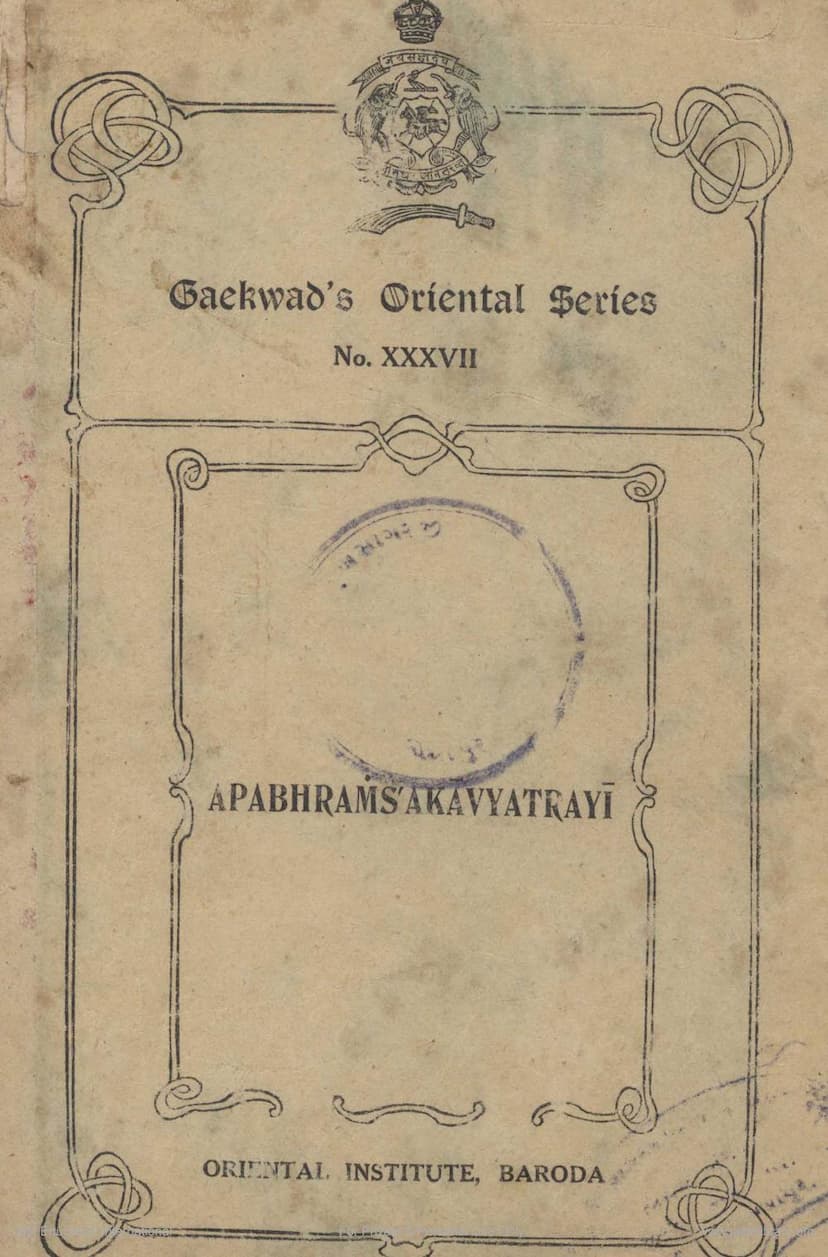Apbhramsa Kavyatrayi
Added to library: September 1, 2025

Summary
This summary provides a comprehensive overview of the Jain text "Apabhramsa Kavyatrayi," based on the provided text and catalog link.
Book Title: Apabhramsa Kavyatrayi (Three Apabhramsa Works) Author: Jinadattasuri Editor/Publisher: Lalchandra Bhagwandas Gandhi, Oriental Institute, Baroda Year of Publication: 1927 Catalog Link: https://jainqq.org/explore/001875/1
Overall Summary:
"Apabhramsa Kavyatrayi" is a significant publication in the Gaekwad's Oriental Series, presenting three literary works in the Apabhramsa language by the revered Jain monk Jinadattasuri. The volume is meticulously edited with an introduction, notes, appendices, and commentaries, making it a valuable resource for scholars of Jain literature, Apabhramsa language, and medieval Indian literature. The book aims to bring to light and disseminate these important Apabhramsa poems that contribute to the understanding of Jain philosophical and ethical teachings.
Key Components of the Book:
-
Introduction (Bhumika): The introduction provides a detailed account of the Apabhramsa language and its poetic significance. It then focuses on the life and works of Jinadattasuri, placing him within the context of his influential guru, Jinavallabhasuri. The editor, Lalchandra Bhagwandas Gandhi, elaborates on the historical and literary importance of Jinadattasuri and his works, highlighting their contribution to Jain tradition and Apabhramsa literature. The introduction also includes extensive historical and biographical details about Jinavallabhasuri, drawing from various Jain scriptures and inscriptions to establish his prominent position and influence.
-
Apabhramsa Kavyatrayi (The Three Apabhramsa Works): The core of the book consists of three distinct works by Jinadattasuri:
- Charchari (चर्चरी): This work is described as a praise of Jinavallabhasuri, the guru of Jinadattasuri. It is composed of forty-seven verses (vṛttas) and is characterized by its devotional and eulogistic nature, praising Jinavallabhasuri's profound scholarship, spiritual guidance, and adherence to Jain principles. The Charchari is considered a tribute to the guru's eminence and influence.
- Upadesharasayana Rasaka (उपदेशरसायनरासक): This work is a didactic poem in the "Rasaka" form, offering teachings and advice. It focuses on ethical conduct, spiritual discipline, and the importance of following the right path guided by a true guru. The poem emphasizes the transient nature of worldly life and the ultimate goal of liberation. It aims to guide the audience towards a virtuous life and spiritual progress.
- KalSwarupakulaka (कालस्वरूपकुलक): This work, also in a poetic form (Kulaka), likely deals with the concept of time and its cyclical nature, possibly in relation to spiritual progress or the unfolding of events in the world and spiritual life. The title suggests a contemplation of the essence of time and its implications.
-
Commentaries and Appendices: The book includes commentaries on the presented works, likely offering explanations of the Apabhramsa verses, their meaning, and their philosophical context. The appendices contain supplementary material such as:
- Sangha-Pattaka (सङ्घ-पट्टक): This might refer to a document or text related to the Jain monastic order or a specific lineage.
- Ganadharashatak (गणधरसार्धशतक): This likely refers to a work related to the hundred Ganadharas (chief disciples of Tirthankaras).
- Suguroparyatantrya (सुगुरुपारतन्त्र्य): This title suggests a text on devotion and submission to the guru, possibly a praise or treatise on the guru-disciple relationship.
- Jinadattasuri-Stuti (जिनदत्तसूरिस्तुति): A hymn or praise dedicated to Jinadattasuri.
- Pathabheda (पाठभेद): Variations in the text or readings.
- Vishishtanamasuchi (विशिष्टनामसूची): A list of specific names mentioned in the text, likely important figures or concepts.
Significance:
- Linguistic Importance: The book is crucial for the study of the Apabhramsa language, a transitional phase between Prakrit and modern Indo-Aryan languages. The works of Jinadattasuri provide valuable insights into the grammar, vocabulary, and poetic conventions of Apabhramsa.
- Literary Value: Jinadattasuri was a prolific writer, and these works contribute to the rich tradition of Jain narrative and didactic poetry in Apabhramsa. The inclusion of commentaries enhances their accessibility and scholarly value.
- Historical Context: The detailed introduction and appendices, particularly those focusing on Jinavallabhasuri and Jinadattasuri, offer a glimpse into the history of Jainism, its monastic orders (Gachhas), and intellectual currents during the medieval period. The extensive citations of Jinavallabhasuri's life and works underscore his importance and influence.
- Spiritual and Ethical Teachings: The poems themselves convey profound Jain spiritual and ethical teachings, guiding readers towards righteous conduct, detachment from worldly affairs, and the pursuit of liberation.
In essence, "Apabhramsa Kavyatrayi" is a scholarly compilation that preserves and illuminates vital aspects of Jain literary heritage, the Apabhramsa language, and the lives of prominent Jain spiritual leaders.